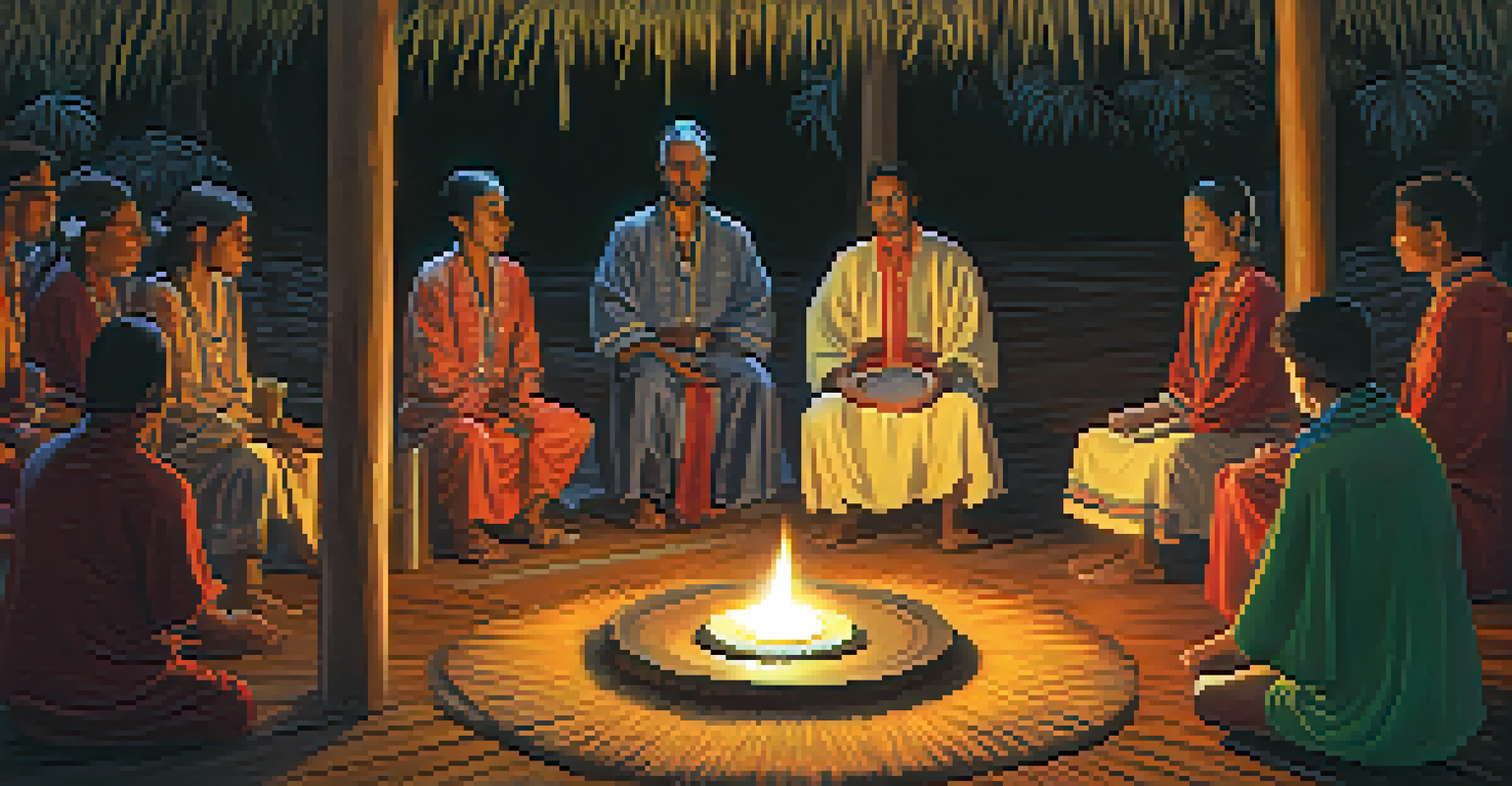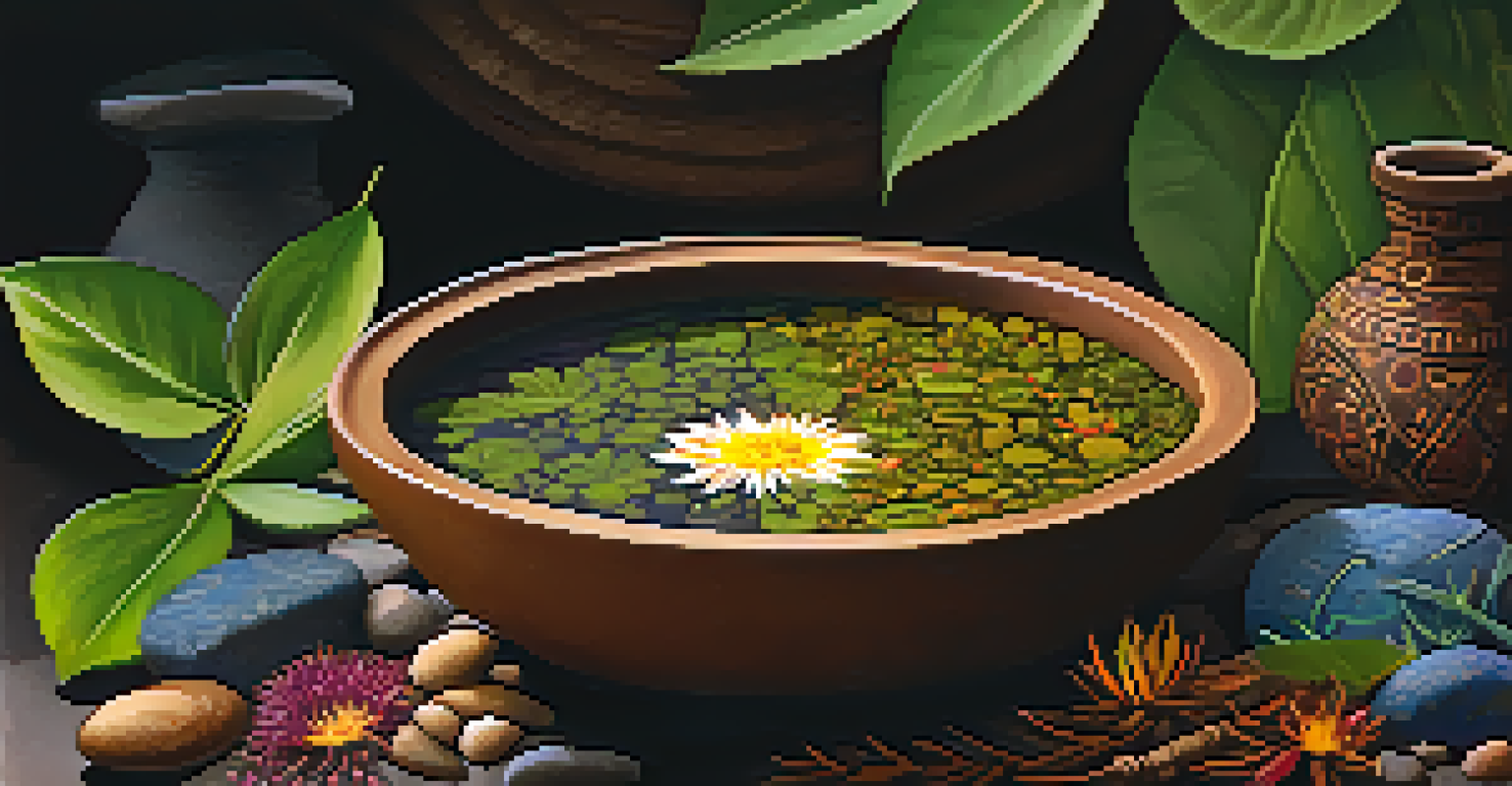Exploring Ayahuasca: Benefits for Personal Growth and Healing

What is Ayahuasca and Its Cultural Roots?
Ayahuasca is a powerful brew made from the Banisteriopsis caapi vine and other plants, traditionally used by indigenous tribes in the Amazon. Its origins trace back centuries, where shamans utilized it for spiritual and healing practices. This connection to cultural heritage is vital, as it underscores the brew’s role in community and tradition.
The experience of Ayahuasca can be transformative, enabling individuals to confront their shadow self and emerge with a newfound perspective on life.
The use of Ayahuasca is not just about the drink itself; it's deeply intertwined with rituals that enhance its effects. These ceremonies often involve music, chanting, and guided experiences led by experienced shamans. This holistic approach helps participants navigate their journeys in a supportive environment.
As interest in Ayahuasca expands beyond the Amazon, many are drawn to its potential for personal transformation. However, understanding its cultural significance is essential for those considering this profound experience. Respecting its roots can lead to a more meaningful engagement with the brew.
The Science Behind Ayahuasca's Effects
At the heart of Ayahuasca's power lies the compound DMT (dimethyltryptamine), which is known for inducing vivid hallucinations and altering perceptions. When consumed in Ayahuasca, DMT interacts with the brain's serotonin receptors, creating intense experiences that can lead to profound insights. Science has begun to explore these effects, linking them to emotional breakthroughs and healing.

Research indicates that Ayahuasca may help alleviate symptoms of anxiety, depression, and PTSD. Many participants report feeling a sense of clarity and emotional release following their journeys. This therapeutic potential is increasingly recognized, making Ayahuasca a subject of interest in psychological studies.
Ayahuasca's Cultural Significance
Understanding Ayahuasca's roots in indigenous traditions is essential for a respectful and meaningful experience.
While the science is still evolving, the anecdotal evidence from those who have experienced Ayahuasca suggests it can be a catalyst for change. It may help individuals confront unresolved trauma, leading to personal growth and a deeper understanding of oneself. This blend of science and spirituality makes Ayahuasca a fascinating area of exploration.
Personal Growth Through Ayahuasca Experiences
Many people turn to Ayahuasca not just for healing, but also for personal growth. Participants often share stories of transformational insights that help them reevaluate their lives. These experiences can lead to a renewed sense of purpose and direction, which is especially appealing in today’s fast-paced world.
Ayahuasca is not just a medicine; it's a doorway to understanding the depths of our emotional and spiritual lives.
The introspective nature of Ayahuasca journeys often encourages individuals to confront their fears and limitations. This confrontation can be daunting, but it also opens the door to significant personal development. By navigating these challenges, people can emerge with a stronger sense of self and clarity about their goals.
Moreover, the communal aspect of Ayahuasca ceremonies fosters a sense of connection among participants. Sharing these profound experiences can build lasting bonds and provide a support network for continued growth. In this way, Ayahuasca serves not only as a personal tool but also as a means of fostering community.
Healing Emotional Trauma with Ayahuasca
For many, Ayahuasca offers a unique approach to healing emotional trauma. The brew’s psychoactive properties can help individuals revisit and process painful memories in a safe setting. This therapeutic journey can lead to a release of pent-up emotions and a sense of catharsis that traditional therapies may not provide.
Participants often report that Ayahuasca allows them to view their past experiences with new perspectives. This reframing can be crucial for healing, as it enables individuals to find meaning in their struggles. The ability to confront and integrate these experiences is a fundamental aspect of emotional healing.
Therapeutic Potential of Ayahuasca
Ayahuasca shows promise in alleviating emotional trauma and fostering personal growth through profound insights.
However, it’s essential to approach Ayahuasca as a complement to, rather than a replacement for, conventional therapy. Combining these approaches can create a more holistic healing experience. Ultimately, Ayahuasca can be a powerful tool for those ready to engage deeply with their emotional landscapes.
Navigating the Ayahuasca Journey Safely
Safety is paramount when considering an Ayahuasca experience. It’s critical to participate in ceremonies led by experienced and reputable facilitators who respect the traditions and rituals involved. Researching and choosing the right setting can significantly enhance the safety and effectiveness of the journey.
Before participating, individuals should also consider their physical and mental health. Certain medications and pre-existing conditions can interact negatively with Ayahuasca. Consulting with a healthcare professional beforehand can help mitigate potential risks and ensure a safer experience.
Once in a ceremony, participants are encouraged to approach the experience with an open mind and heart. This mindset can facilitate deeper insights and connections during the journey. With the right preparation and guidance, Ayahuasca can be a transformative and safe experience.
The Role of Integration After Ayahuasca
The process of integration is crucial after an Ayahuasca experience. Many participants find that the insights gained during the journey need time to settle and be understood in everyday life. Integration can involve reflecting on the experience, journaling, or even discussing feelings with a trusted friend or therapist.
Support groups and integration circles are also valuable resources for those who have undergone Ayahuasca ceremonies. These gatherings allow individuals to share their experiences and learn from others, fostering a sense of community. Engaging with peers can help individuals make sense of their journey and maintain the positive changes they’ve experienced.
Importance of Ethical Use
Engaging with Ayahuasca ethically ensures respect for indigenous communities and the preservation of cultural practices.
Ultimately, integration helps solidify the lessons learned during Ayahuasca. By actively working to incorporate these insights into daily life, participants can continue their personal growth long after the ceremony ends. This ongoing process can lead to lasting transformation and a deeper connection to oneself and others.
Considering the Ethical Aspects of Ayahuasca Use
As Ayahuasca gains popularity outside its traditional context, ethical considerations come to the forefront. It’s essential to approach this sacred plant medicine with respect and an understanding of its cultural significance. Engaging with indigenous communities and supporting ethical practices can help preserve the integrity of the Ayahuasca experience.
Contributing to local economies and respecting the knowledge of indigenous healers is vital. Many of these communities rely on Ayahuasca for their cultural identity and livelihood. By prioritizing ethical engagement, participants can ensure that their journeys do not exploit or harm these communities.

Ultimately, being mindful of the ethical implications of Ayahuasca use enriches the experience. It fosters a deeper appreciation for the traditions and practices surrounding the brew. This respect can lead to a more meaningful and responsible journey into personal growth and healing.